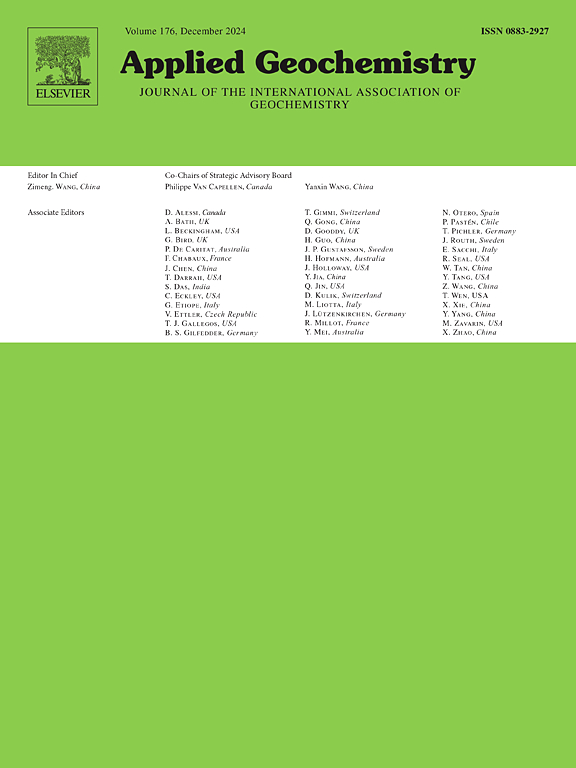Destination of metals transported by hydrocarbon fluids in lead-zinc mineralization of the ediacaran strata in the central Sichuan Basin, China
IF 3.4
3区 地球科学
Q1 GEOCHEMISTRY & GEOPHYSICS
引用次数: 0
Abstract
Hydrocarbon fluids play crucial roles in Pb–Zn mineralization, yet the contribution of metals from hydrocarbon fluids remains a key research topic. Based on petrographic analyses of sulfide minerals and solid bitumen, combined with LA-ICP-MS analysis of sphalerite, this study investigates hydrocarbon-phase evolution during metal mineralization and the composition of trace elements and rare earth elements (REEs) in sphalerite formed in various hydrocarbon phases. The study focuses on the classical lead-zinc mineralization belt of the Yangtze Block, South China. By comparing the composition of trace elements and REEs in solid bitumen and sphalerite across different hydrocarbon phases, the hydrocarbon contribution to metal mineralization is assessed. The results indicate that hydrothermal activity induced oil cracking in the reservoir, leading to the formation of two distinct types of sphalerites before and after oil cracking, reflecting environments with and without crude oil. Sphalerites formed before and after oil cracking exhibit formation temperatures of 132–252 °C and 88–202 °C, respectively. Both sphalerites share identical ore-forming fluid sources with similar sulfur and oxygen fugacity and the weak difference in their trace element compositions was caused by the decreasing fluid temperature, suggesting that crude oil did not significantly contribute to ore-forming metals. Moreover, the compositions of trace elements and REEs in both sphalerites differ from those of solid bitumen from oil cracking, further supporting that the metals for mineralization were not from crude oil. Instead, hydrothermal fluids induced rapid oil cracking, causing metals like Pb and Zn in crude oil to precipitate with solid bitumen without mineralization. This study provides direct evidence that metals transported by hydrocarbons precipitate with solid bitumen during oil cracking and do not contribute to Pb–Zn mineralization in medium-to high-temperature hydrothermal systems, disproving previous assumption that inferred metal involvement in mineralization solely based on high metal concentrations in hydrocarbon fluids.
川中埃迪卡拉系地层铅锌成矿作用中烃类流体输运金属的归宿
烃类流体在铅锌成矿过程中起着至关重要的作用,但烃类流体中金属的贡献仍然是一个重要的研究课题。基于硫化物矿物和固体沥青的岩石学分析,结合闪锌矿的LA-ICP-MS分析,研究了金属成矿过程中烃类的演化,以及不同烃类相形成的闪锌矿中微量元素和稀土元素的组成。以华南扬子地块经典铅锌成矿带为研究对象。通过比较不同烃相固体沥青和闪锌矿中微量元素和稀土元素的组成,评价了烃类对金属成矿作用的贡献。结果表明,热液活动诱发了储层中的原油裂解,导致原油裂解前后形成两种不同类型的闪锌矿,反映了有无原油的环境。油裂解前后形成的闪锌矿形成温度分别为132 ~ 252℃和88 ~ 202℃。两种闪锌矿具有相同的成矿流体来源,硫氧逸度相近,微量元素组成差异微弱是由于流体温度下降所致,说明原油对成矿金属的贡献不显著。此外,两种闪锌矿的微量元素和稀土元素组成与石油裂解固体沥青不同,进一步说明成矿金属并非来自原油。相反,热液流体引起了石油的快速裂解,导致原油中的铅和锌等金属与固体沥青一起沉淀而没有矿化。该研究为石油裂解过程中金属随固体沥青析出提供了直接证据,证明在中高温热液系统中,金属不参与铅锌矿化,推翻了以往仅根据烃类流体中金属含量高推断金属参与矿化的假设。
本文章由计算机程序翻译,如有差异,请以英文原文为准。
求助全文
约1分钟内获得全文
求助全文
来源期刊

Applied Geochemistry
地学-地球化学与地球物理
CiteScore
6.10
自引率
8.80%
发文量
272
审稿时长
65 days
期刊介绍:
Applied Geochemistry is an international journal devoted to publication of original research papers, rapid research communications and selected review papers in geochemistry and urban geochemistry which have some practical application to an aspect of human endeavour, such as the preservation of the environment, health, waste disposal and the search for resources. Papers on applications of inorganic, organic and isotope geochemistry and geochemical processes are therefore welcome provided they meet the main criterion. Spatial and temporal monitoring case studies are only of interest to our international readership if they present new ideas of broad application.
Topics covered include: (1) Environmental geochemistry (including natural and anthropogenic aspects, and protection and remediation strategies); (2) Hydrogeochemistry (surface and groundwater); (3) Medical (urban) geochemistry; (4) The search for energy resources (in particular unconventional oil and gas or emerging metal resources); (5) Energy exploitation (in particular geothermal energy and CCS); (6) Upgrading of energy and mineral resources where there is a direct geochemical application; and (7) Waste disposal, including nuclear waste disposal.
 求助内容:
求助内容: 应助结果提醒方式:
应助结果提醒方式:


